10+ Sample Landscaping Services Contract
-
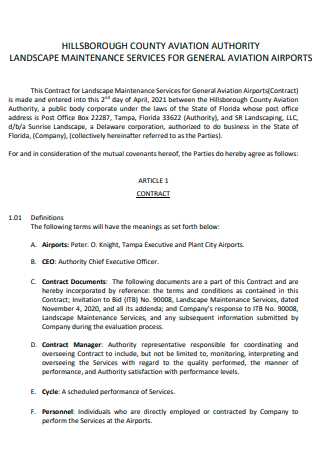
Landscape Maintenance Services Contract
download now -
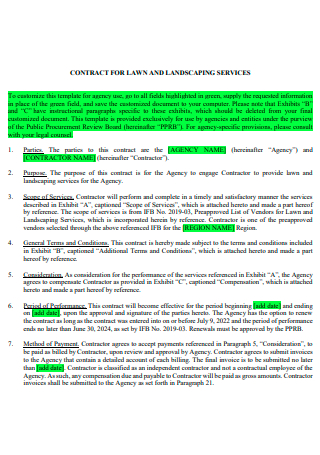
Lawn and Landscaping Services Contract
download now -
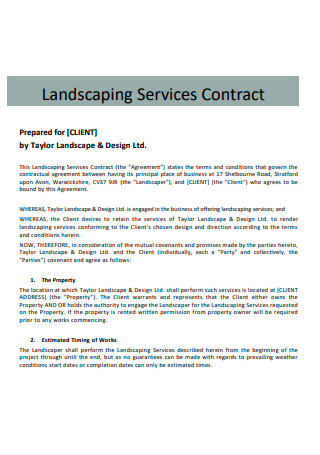
Landscaping Services Contract in PDF
download now -
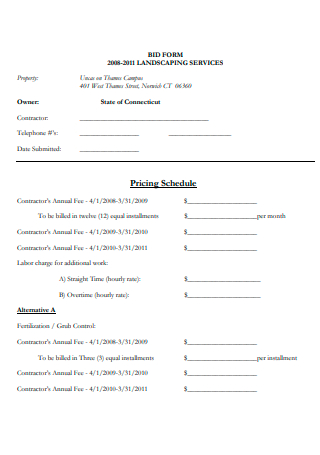
Landscaping Services Contract Bid Form
download now -
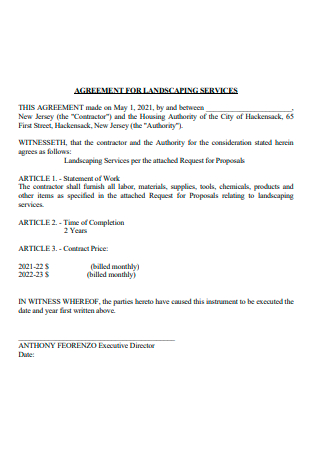
Landscaping Services Agreement Contract
download now -
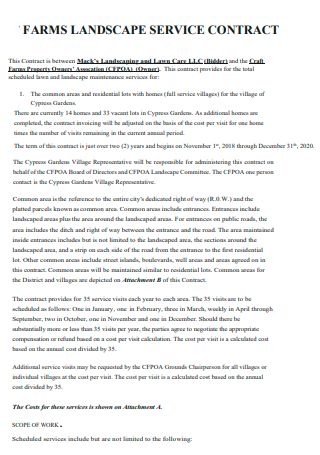
Farms Landscape Services Contract
download now -
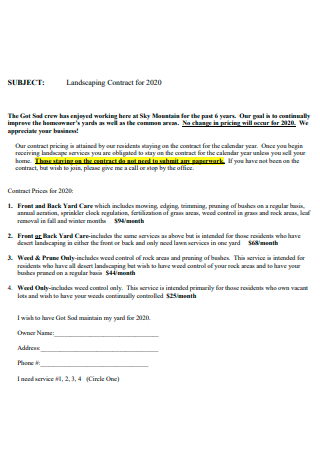
Basic Landscaping Services Contract
download now -
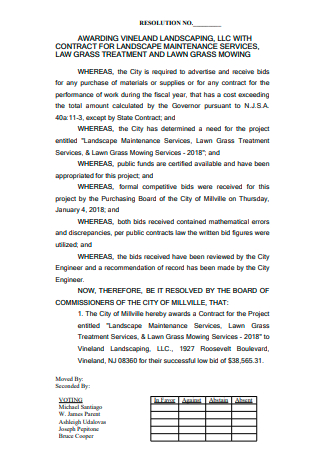
Landscaping Services Contract Example
download now -
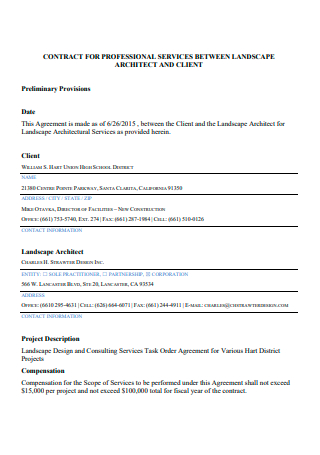
Landscape Professional Services Contract
download now -
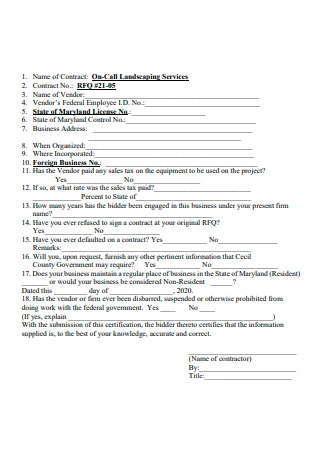
On-Call Landscaping Services Contract
download now -
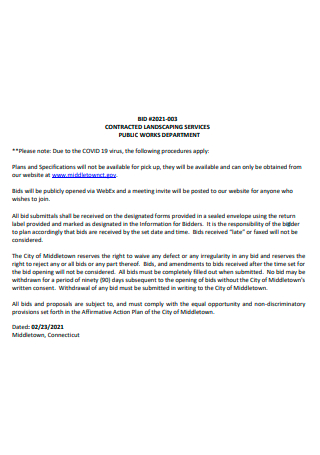
Landscaping Services Contracted
download now
FREE Landscaping Services Contract s to Download
10+ Sample Landscaping Services Contract
What Is Landscaping Services Contract?
What Is a Landscaping Services?
The Benefits of a Landscaping Contract Include:
Elements of the Landscaping Contract:
What Should the Landscaping Services Contract Contain?
FAQs
What are the landscaper responsibilities?
What is the variance between rough grade and final grade?
How much does the landscaping cost?
Do contractors expect you to negotiate?
How much does professional landscaping cost?
What is the Landscape Design Process?
What Is Landscaping Services Contract?
A landscaping contract, also known as a landscaping services contract, is a legal tool entered into by a landscaping contractor and a client. The agreement stipulates payment terms, types of services provided, party contact information, and how to handle legal disputes. It becomes legally enforceable and mutually agreed upon when both parties sign a landscaping contract.
In addition, landscaping contractors perform immense work that extends far beyond, and naturally establish relationships with their clients with a landscaping contract. These creative experts may grade the land, install irrigation fixtures, and design aesthetically-pleasing lawns and gardens. They usually operate as sole-proprietorships or limited liability corporations.
Per se, it is important that landscaping contractors not only know how to negotiate a contract but also have a dependable, enforceable document in place.
What Is a Landscaping Services?
A landscaping service is in charge of envisioning unique outdoor spaces and working with other landscape professionals to turn their visions into gardens and public parks for people to enjoy. Their obligations include planting flowers and trees, trimming shrubbery and overseeing the installation of fountains, benches, fences, and walking paths.
Meanwhile, a landscaping contractor offers work to a property owner where there is the need to set the agreement up according to the jurisdiction of the state and the job at hand. It is standard to ask clients to sign a landscaping contract and is nothing out of the ordinary. Make sure to provide as many details as rational to accomplish the primary objectives of the agreement.
While the Landscaper position often includes planting trees, shrubs, and flowers to either enhance an existing outdoor space or create a new one, some positions also handle grading and installing lawns or constructing hardscapes such as decks, walkways, and patios while others help with installing sprinkler or lighting systems. Furthermore, landscapers can be employed in several commercial and residential settings like motels, office buildings, shopping malls, homes, and apartment buildings.
The particular skills required from a Landscaper can vary from employer to employer, moreover, job descriptions for a Landscaper may contain the following skills and qualifications:
- Physical stamina
- Visualization
- Self-motivation
- Creativity
The Benefits of a Landscaping Contract Include:
- Terms and conditions related to payments so that contractors know what to expect and when to expect it.
- Prevents unnecessary legal disputes by having everything in writing and understood by both parties.
- Guarantees and warranties so that clients know that your craftsmanship is backed by promises to replace, repair, or refund.
- Descriptions of specific services to be performed so that there is no disagreement later.
- Existence of a legally binding landscaping contract demonstrates that a real relationship existed.
A reasonable and enforceable contract is vital to have in place when beginning a new project whether you are a landscaper or a customer. Ensure that it addresses any issues that could arise while having the basic working requirements of a contract. Also, if you need direct legal advice, seek assistance from a contract lawyer in your state.
Elements of the Landscaping Contract:
A landscaping contract should contain various essential elements in order to make it executory and lawful. Instead of having complicated legal language, the more easily clients and contractors understand the agreed-upon terms, the fewer arguments may arise in the future.
In addition to simple language, you should integrate the following elements into the landscaping contract:
- The names and contact information of the landscaping client and contractor.
- A statement that acknowledges both parties mutually consent to the terms and conditions.
- A statement of work that lists down the services being offered to the customer, with inclusion of ongoing maintenance and site inspections.
- The contract’s start and end date along with the terms of the payment.
- What to do just in case the contract needs to be revised or terminated.
- How you will handle non-payment claims, including the use of a lien.
- A finished copy of your invoice template to show at the time of accepting payment or signing.
- Limitation of liability with regard to third-parties.
- The local, state, or federal laws that govern the agreement.
- A dated signature from both parties acknowledging the agreement.
You may need to put additional sections to your landscaping services agreement depending on where you live and the services you provide. The biggest mistake to avoid does not include enough information or overwhelming customers. To help you handle your contract’s particulars always seek legal advice from a licensed contract lawyer in your state.
What Should the Landscaping Services Contract Contain?
In consideration of the mutual pledges and promises made by the parties hereto, the Landscaper and the Client promise and agree as follows:
Per se, note a few differences as listed below:
- An agreement that the client allows the landscaping contractor on the premises as needed or with specific notification requirements.
- A detailed description of all materials and parts being used on the project.
- The specific person accountable for maintenance and inspection of newly installed system.
- A more in-depth list of current and ongoing services being provided.
- Offset costs by allowing a customer to keep a logo or signage posted in the landscaped area.
- Due to the extensive nature of landscaping work, it must address your unique needs. Avoid making the mistake of confusing one contract for another when asking another party to agree to the terms.
- Other matters that need to be tackled as applicable.
FAQs
What are the landscaper responsibilities?
The Landscaper position is characteristically under the direction of Professional Grounds Managers and completes a variety of tasks to achieve a practical and pleasant outdoor area. They may also care for indoor plants and garden in public and commercial facilities such as botanical gardens, malls, and hotels. Their job description may contain the following duties and responsibilities: mowing, edging and fertilizing lawns; weeding and mulching landscape beds; trimming small trees, hedges and shrubs; removing unwanted, dead or damaged trees; planting shrubs, flowers and trees; watering gardens, lawns and landscapes and; monitoring and maintaining plant health. Landscapers typically work for local governments or landscaping companies to design aesthetic outdoor spaces. They make use of their knowledge of horticulture and eye for design to contribute to their art and ideas. Their job is to maintain relationships with plant nurseries and garden supply companies, travel to landscaping sites and work with other landscaping professionals to attain their goals. They may also perform general preservation tasks like raking leaves, administering pesticides, deadheading flowers, and mowing lawns.
What is the variance between rough grade and final grade?
Rough grading is a clay/dirt grading which creates the slope of the property, which is finished before any of the final elements of the landscape can be installed. Rough grade is naturally completed by the home builder. The final grade is the grading of the property that starts the final shape and elevation of the property, and then followed by the installation of the grass, hardscaping, and plant material. Final grade is finalized by a landscaper.
How much does the landscaping cost?
The cost of landscaping depends upon the type of services that is requested as well as whether there will be an ongoing maintenance. While the national average of annual landscaping costs is around $14,000, this number may be higher or lower depending upon your needs. It is best to always get several bids on a project before selecting a provider.
Do contractors expect you to negotiate?
If they are competing for a job, many general contractors are willing to negotiate their prices and terms. It is helpful to be straightforward with contractors and let them know what you expect from the process. Also, do not forget to prepare to answer the contractor’s questions, as this will help craft a more careful estimation.
How much does professional landscaping cost?
There are innumerable variables that go into quoting landscaping projects of any size. The best way to receive an exact estimate for your project is to contact one for a quote. Landscaping services can inspect your property in-person and work with you to provide an informed estimate, with no pressure to start right away. Additionally, a budget of $15,000 for a new build landscape that sees your architectural guidelines is a healthy starting point for your project. However, renovation projects normally cost more due to the removal component of your existing landscape.
What is the Landscape Design Process?
The primary consultation entails an onsite meeting to hear your ideas/vision for the property.
Deliberate possibilities for the site based upon your wishes and budget. Upon mutual determination that you have a good basis for partnership, the service will prepare a design services proposal indicating the scope of work and the estimated fees for the project.
Adjustment of all input from the consultation, review of budget discussion, favorite photos/gardens, and determination of a color palette for the garden.
Site analysis & base map preparation—includes measuring site, analyzing soil, taking photographs, conducting building code research, observing sun/shade/wind patterns, noting drainage issues/noise problems/privacy issues, and identifying plant material to be retained/removed/relocated.
Concept sketches and client review. Once the service completes the base plan, they will develop more ideas for you to review. They may also look at examples from books or photographs to help select a design concept and direction.
Preliminary plan development and client review. Determine final location and design for all desired site elements, including patios/decking, walkways, fences, arbors, play areas, outdoor kitchens/eating areas, pool/spa/water features, lawn and planting beds, trees and general plant materials. Choose the building material specifications for the hardscape elements and develop landscape lighting plan, if looked-for.
Planting plan development and client review. Develop plan showing definite location of all plant material, including botanical and common names, quantity and size of each plant selected. Include picture report of all plants.
Master plan preparation. For the final conceptual plan, it may contain any or all of the following: demolition plan, hardscape plan with building materials legend, construction notes/details, lighting plan, planting plan and proposed irrigation zoning plan.
The main purpose of having Landscaping Services Contract is to make sure everything is done correctly by professionals. While landscaping can protect natural waterways, rejuvenate wetlands, and create rain gardens, it can also be of help with regards the water drainage solutions. This in turn will encourage biodiversity and control floods.
One of the smartest ways to utilize spaces is creating good places for people to enjoy their leisure activities. Through this, everyone can enjoy an environment that supplies a certain amount of joy and relaxation.
